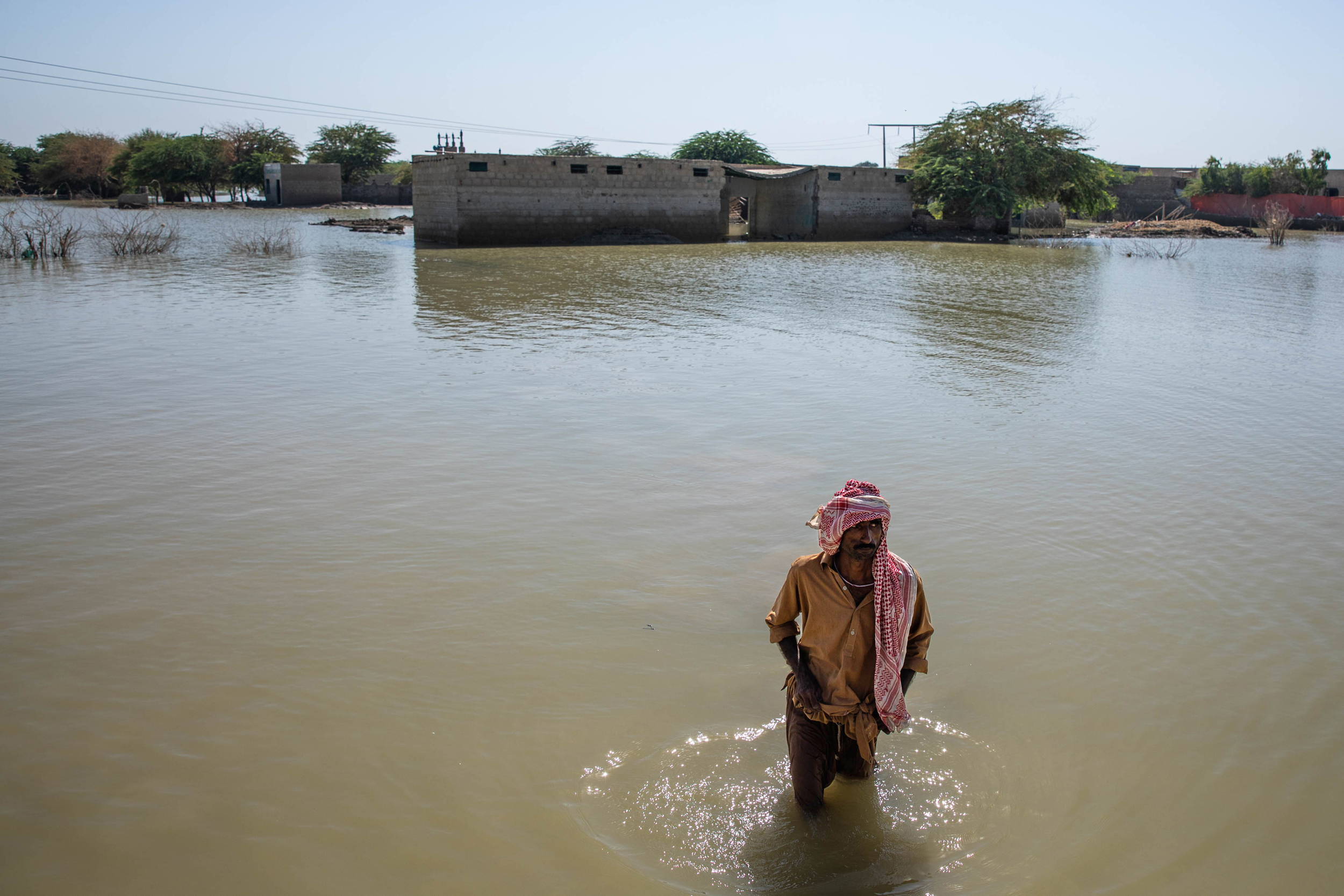Copyright Inside Climate News

As the fossil fuel industry and its political allies ramp up attempts to shut down climate liability initiatives in the United States, large carbon-emitting companies are facing mounting legal claims in Europe from individuals on the frontlines of the worsening climate crisis. Two new climate liability actions have been announced recently against major fossil fuel and cement companies demanding they pay damages to survivors of extreme weather disasters that have devastated communities in the Global South over the past few years. Filipino citizens who suffered personal losses and damage during Typhoon Odette in 2021 initiated legal action on Oct. 23 against the oil major Shell, which has generated over 41 billion metric tons of carbon pollution since the late nineteenth century. Last week, farmers from one of the areas in Pakistan hardest hit by unprecedented flooding in 2022 launched a similar case targeting energy company RWE and cement manufacturer Heidelberg Materials, two of the largest CO2 emitters in Germany. Both cases seek financial compensation for climate-related harms that are on the rise around the world as greenhouse gas emissions and global temperatures continue to reach record levels. “The impacts of climate change are escalating and they are increasingly felt all over the world—not least of all in the hurricane that recently made landfall in Jamaica,” said Tessa Khan, an international climate lawyer and executive director of the U.K.-based organization Uplift, referencing Hurricane Melissa, which slammed into Jamaica as a category 5 storm last week. Uplift is supporting the advocacy campaign around the Odette case. “As communities are left to deal with the devastation these extreme weather events cause, it is inevitable that they will be looking to hold the groups who are responsible in some way for that damage to account,” she said. A landmark 2013 study found that about two-thirds of industrial carbon emissions could be traced back to just 90 fossil fuel and cement companies. The analysis has since been updated and expanded upon, and the U.K.-based think tank InfluenceMap now hosts a database tracking emissions attributable to the 180 largest oil, gas, coal and cement producers—the so-called carbon majors. Shell currently ranks in the top 10 in terms of cumulative global emissions, while RWE and Heidelberg Materials rank 44th and 108th, respectively. Lawyers and climate advocates supporting claims against carbon majors argue that not only have these companies generated substantial shares of climate pollution through their production activities, but that they have long known about the impacts their business would have on the climate. “For years, Shell knew fossil fuels could cause dangerous climate change,” Khan said in a statement. “They had the chance to change course. Instead, they misled the public and helped block our shift to clean energy, all to protect their profits. Now we’re all paying the price with typhoons, floods, and fires.” Reached for comment, a Shell spokesperson said the company agrees “that action is needed now on climate change.” “The suggestion that Shell had unique knowledge about climate change is simply not true,” the spokesperson added. “The issue of climate change and how to tackle it has been part of public discussion and scientific research for decades.” Philippine Survivors Target Shell Typhoon Odette struck the Philippines on Dec. 16, 2021. The storm killed over 400 people, severely injured over 1,000 others and destroyed 1.4 million homes. It caused nearly $1 billion in damage and was the second-costliest typhoon in Philippine history at the time, a result of both high wind speeds and the extent of flooding. A recent extreme event attribution study examining the influence of climate change on the storm found that global warming “more than doubled the likelihood of a compound event like Typhoon Odette.” Now, 67 Filipinos who lost family members, were severely injured or lost their homes during this typhoon are seeking to hold Shell liable and are demanding the company compensate them for their losses. No monetary figure is yet attached to the claim. Greg Lascelles, a partner at the law firm Hausfeld’s London office, representing the Filipino claimants, told Inside Climate News in an email his clients “have suffered significant harm, including personal injury and property damage which will become clearer as the litigation progresses.” A letter outlining the alleged legal violations and requesting compensation has been sent to Shell’s headquarters in London. The notice, called a Letter Before Action, is the first step in the litigation. If no satisfactory agreement between the parties can be reached, a lawsuit would then be filed in court in the U.K. in December. Lascelles explained that while the legal action is being brought in the U.K., “the law applicable to the case is the law of the Philippines” because that is where the harm occurred. The claimants allege that Shell caused damage and acted negligently in violation of the Philippines Civil Code. They also claim that the company violated their rights under the Philippines Constitution, including the right to a balanced and healthful environment. According to a press release announcing the case, it is the “first civil claim to directly link the climate impacts of oil and gas companies to death and personal injury that has already occurred in the Global South.” The release says the case will “also highlight Shell’s deliberate deception and efforts to slow down the energy transition away from fossil fuels by engaging in lobbying, disinformation, and obfuscation of climate science.” Pakistani Farmers Target German Companies While Shell faces a fresh climate liability claim in the U.K., two other carbon majors—RWE and Heidelberg Materials—are similarly facing the prospect of a new climate lawsuit lodged against them in Germany. Letters were sent to both German companies on Oct. 28 demanding financial compensation for damages associated with the 2022 flooding in Pakistan that inundated one-third of the country, killing at least 1,700 people and destroying crops, homes, critical infrastructure and livelihoods. Record-breaking monsoon rains resulted in the massive and unprecedented flooding event that displaced 33 million people and caused around $30 billion in economic losses. “Floodwaters swallowed entire villages,” Dr. Shaikh Tanveer Ahmed, chairman of the HANDS Welfare Foundation, a Pakistani nonprofit, said during a press briefing. Nearly 4.4 million acres of cropland were submerged, he noted, “devastating the backbone of Pakistan’s rural economy.” Forty-three farmers from the Sindh region of Pakistan, one of the regions hardest hit by the floods, are now taking legal action, seeking to recover damages for two years of lost harvests from two of the largest carbon polluters in Germany. “How is it fair or just that we pay the price for a climate crisis that we did not cause, while big corporations in the Global North are still able to make huge profits? Those who are responsible for the damage must pay,” Abdul Hafeez Khoso, a farmer whose fields were decimated by the 2022 floods, said in a press statement. The claim argues that RWE and Heidelberg Materials have contributed significantly to the climate crisis, which intensified and increased the likelihood of the unprecedented 2022 monsoon rains that resulted in damage to the Pakistani farmers. Roda Verheyen, a German lawyer representing the farmers, said her clients are seeking monetary damages under German law, alleging the companies violated their duty of care. The damage amount is estimated to be at least 1 million euros. Steven Meyers, a spokesperson for Heidelberg Materials, said the company received the letter requesting compensation and that it is “currently reviewing this letter.” RWE did not immediately respond to a request for comment. Clara Gonzales, co-director of the business and human rights program at the European Center for Constitutional and Human Rights (ECCHR), which is supporting the farmers’ case, told Inside Climate News that the companies have four weeks to respond to the letter. If they fail to respond or refuse to accept liability, a lawsuit would then be filed in German court in December. “Transnational corporations, which are most responsible for climate change, have so far denied their responsibility for specific climate damage, and that needs to change,” Miriam Saage-Maaß, ECCHR legal director, said during the press briefing. The case builds upon a previous climate liability lawsuit brought against RWE by Saúl Luciano Lliuya, a Peruvian farmer and mountain guide concerned about the flood risk to his home and community associated with a nearby glacial lake that has swelled as the climate warms. In May a court in Hamm, Germany, dismissed the case on the basis that the evidence of an imminent flood risk was not strong enough. The court did, however, rule that large polluters like RWE can in principle be held liable for the impacts of their carbon emissions, regardless of where those impacts occur. This story is funded by readers like you. Our nonprofit newsroom provides award-winning climate coverage free of charge and advertising. We rely on donations from readers like you to keep going. Please donate now to support our work. Donate Now Verheyen said that ruling was significant because, “for the first time worldwide, a court in Germany made clear that it’s possible to hold companies accountable for the consequences of climate change under German or international law.” The new case against RWE and Heidelberg is now seeking to apply that ruling to a situation in which the damage has already occurred. Nikki Reisch, climate and energy program director at the Center for International Environmental Law, told Inside Climate News that this case may have a better chance at succeeding. “With the evidence of climate risk and harm only mounting and the science only growing stronger and clearer, future claims are more likely to prevail.” The “Holy Grail” of Climate Change Litigation Tort lawsuits aiming to hold corporations liable for climate-related losses and damage, like the new ones announced in the U.K. and Germany, are what has been referred to in the climate litigation space as the “Holy Grail,” Sophie Marjanac, a climate lawyer and director of legal strategy at the Polluter Pays Project, told reporters during a media briefing several months ago. “This is where companies are really found to be responsible and liable for the impacts of their greenhouse gas emissions,” she explained. “These are the [cases] that the companies really fear, Marjanac added. “These are the ones that can really have the power to make a difference.” Carbon majors are facing a rising tide of these cases seeking damages and accountability. In the U.S., more than 30 such lawsuits have been brought against fossil fuel companies, and other climate liability cases are arising in Europe and elsewhere. “This is very reflective I think of the growing impatience with the injustice of the climate crisis.” — Nikki Reisch, Center for International Environmental Law In Switzerland, a court is set to soon decide whether a case brought by Indonesian islanders against the cement giant Holcim in 2023 will be moving forward. That case seeks not only compensation for loss and damages but also a court order for Holcim to reduce its emissions in line with global climate goals. A similar case brought in 2024 by a farmer in Belgium against the French oil major TotalEnergies will have an initial hearing later this month. Reisch said it is not surprising to see more individuals and communities affected by the climate crisis turning to courts demanding accountability from corporate polluters. “This is very reflective I think of the growing impatience with the injustice of the climate crisis,” she said, “and of an unstoppable movement to make polluters pay, to make those most responsible for bringing the world to the brink to halt their harmful conduct and bear their share of the costs.” French Court Finds TotalEnergies Liable Other types of climate cases aim to hold polluting corporations accountable for misleading advertising and communications, especially companies attempting to portray their products and businesses as environmentally sustainable and aligned with global climate targets. On Oct. 23, the same day that the new case against Shell was announced, a court in France delivered a landmark verdict in a climate greenwashing case against TotalEnergies. The court found the oil major misled consumers with its statements about its aspirations to achieve net-zero emissions by 2050 and to be a major player in the energy transition, given that the company is currently expanding its oil and gas production. According to Greenpeace France, one of the French nonprofit groups that brought the case, the verdict marked the “first time in the world that a major oil and gas company has been convicted by the courts for misleading the public about its contribution to the climate crisis.” “That decision is really significant in putting the industry on notice,” Reisch told Inside Climate News. In a statement posted to its website, TotalEnergies said that it “acknowledges the decision” and has decided not to appeal. It defended its energy-transition record and said the impact of the decision involves removing three paragraphs from its website. For Gonzales, at the European Center for Constitutional and Human Rights, who worked on the case in a previous role with Greenpeace France, the verdict against TotalEnergies represents an important breakthrough for corporate climate accountability. “I think it’s only the beginning of the end of the era of impunity,” she said.



